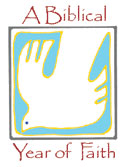Official Website of the
Catholic Diocese of Little Rock
Jesus is our Passover in the Eucharist
Published: March 9, 2013
This is the sixth column in a 14-part series
By Clifford M. Yeary
Associate Director, Little Rock Scripture Study
All four Gospels associate the Last Supper with the Jewish feast of the Passover in one way or another (Mark 14:12-14; Matthew 26:17; Luke 22:8-15; John 13:1-4). Viewing the Last Supper as a meal in celebration of the Jewish Passover tells us that Jesus and his disciples regarded themselves as practicing Jews.
 Jesus was both celebrating God's fidelity to the Jewish people and giving himself as the source and sign of a new covenant between God and humanity. The new covenant broadens and deepens the older one, making it possible for God's covenantal love to extend far beyond Israel.
Jesus was both celebrating God's fidelity to the Jewish people and giving himself as the source and sign of a new covenant between God and humanity. The new covenant broadens and deepens the older one, making it possible for God's covenantal love to extend far beyond Israel.
From a Jewish perspective, those who eat the Passover meal are not only celebrating the historical significance of the first Passover, they are participating in the saving events of Passover itself. The Passover events are those that led to the liberation of the Hebrew slaves from Egypt.
Passover marks their deliverance from oppression and the flight from Egypt that would take them to a land of freedom and prosperity. Because of the Passover they are now free to be a people uniquely dedicated to the God who liberates them. (See Exodus 12:1-17.)
Eating the Passover is itself an act of liberation. The freedom to worship God as part of a people specifically called into a covenant relationship with God was at the very heart of what it meant to be a Jew in Jesus' day and also today.
Jesus, however, added several distinctive notes to the Last Supper that distinguish it from Passover. Jesus likened meals shared in his presence to a magnificent banquet, an ultimate banquet that was to be held in the kingdom of God (Luke 5:30-35). Jesus frequently spoke of this kingdom in a way that suggested that it was already present in a special way for those who accepted his message.
In Matthew's account of the Last Supper, Jesus informs his disciples that, "from now on I shall not drink this fruit of the vine until the day when I drink it with you new in the kingdom of my Father." (Matthew 26:29.) Only in Matthew do we find the additional emphasis of Jesus drinking the fruit of the vine "with you," that is, with his disciples. This strong note of fellowship is characteristic of Matthew. In Matthew, Jesus assures his followers that "where two or three are gathered together in my name, there am I in the midst of them" (Matthew 18:20).
This statement dramatically reflects the experience of Matthew's community at Eucharist. They were acutely sensitive to the presence of the risen Christ joining with them in their celebrations of Eucharist. Eucharist is a real experience of dining with Christ in the kingdom of his Father.
At the heart of the Passover meal is a roasted lamb that was to have been ritually sacrificed in the Jerusalem Temple before being eaten in the home. This sacrifice is essential to the Passover story of the liberation of God's people. While the Passover means liberation for Israel, it had grave consequences for Egypt and thus is understood the reason for the name, "Passover."
God's judgment fell on the Egyptian slave masters, but it passed over the Hebrews who, on the night of their liberation, sacrificed a spotless lamb to their God. In the judgment that falls on their oppressors, Israel emerges as a people. On this note of tension between God's mercy and God's justice, Jesus' actions during the Last Supper both echo and yet distinguish themselves from the themes of the Passover.
In Matthew, Mark and Luke, Jesus clearly identifies himself with bread and wine that he gives to his disciples at the Last Supper. Jesus' words and actions were meant to convey the message that Jesus was giving himself in the bread and through the cup.
"This is myself," he was saying, according to Abbot Jerome Kodell, OSB. "By sharing this meal with you I am bringing you into an intimate relationship with myself." Jesus tells the disciples that what they drink is his blood that is for the forgiveness of sins "for the many" (Matthew 26:28). According to Abbot Jerome "for the many" is a Semitic way of saying "for everyone but myself."
As depicted in Matthew, the Last Supper presents a renewed Passover, our Eucharist and the death and resurrection of our Lord. In this Passover, all nations, all peoples are now offered forgiveness and invited to eat and drink in the kingdom of God.
Study Questions
- What is the significance of the celebration of Passover for the Jewish people?
- What is the relationship between Jesus' Last Supper and the Jewish Passover?
- How are some themes of a Passover celebration recast in Matthew's account of the Last Supper? How does the Last Supper differ from a Passover celebration?
- Matthew's Gospel emphasizes the presence of the risen Christ in their eucharistic celebrations. How does this emphasis affect your own understanding of Eucharist?
This article was originally published in Arkansas Catholic March 9, 2013. Copyright Diocese of Little Rock. All rights reserved. This article may be copied or redistributed with acknowledgement and permission of the publisher.









